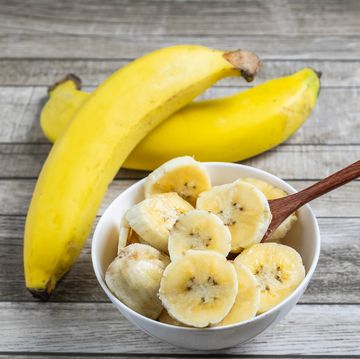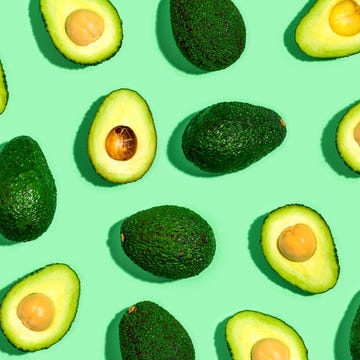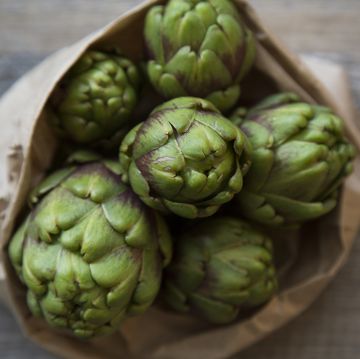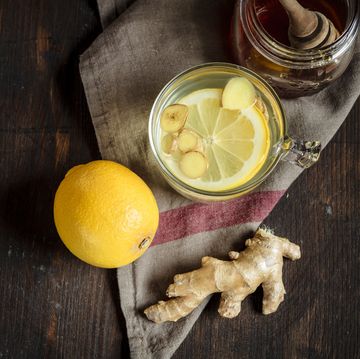Some might deny it, your S.O. might refuse to believe it, and your girlfriends might only talk about it after a few glasses (or bottles) of wine—but everyone poops. "Pooping might be taboo because of the smells and sounds associated with it," says Sophie Balzora, M.D., gastroenterologist at NYU Langone medical center. Okay, so maybe most people don't want to talk about it—but that doesn't mean you're not curious. Behold, the essential fecal facts your mom never told you.
What Poop is Made Of
Most of what you see in the toilet bowl is made up of fiber, undigested foods, water, undigested fats, cholesterol, salt, phosphates, and dead and live bacteria. Actually, about 30 percent of your bowel movements are dead bacteria you didn't digest, says Gina Sam, M.D., director of the Mount Sinai Gastrointestinal Motility Center at Mount Sinai Hospital.
When they're alive and well inside your gut, those bacteria help digest most of what you eat and produce stinky gasses like sulfur and methane. Those lovely substances are what make your bowel movements so fragrant, says Sam. Plus, if you eat a lot of fat, a lot of sugar, or raw, hard-to-digest veggies like broccoli or cabbage, that can make those bacteria produce even more gas, which makes the bathroom smell worse than usual, says Sam.
For the most part, poop is typically brownish due to the interaction between the bile and the food it helps to digest, says Sam. However, as you are probably well aware, there are times where that familiar hue is dramatically different. If your number two is bright green, it could indicate that your food was passed through your digestive system a little too fast (but it’s not unhealthy). If your stool is a yellowish color, it could mean that your body is having trouble absorbing fats or you might have a gluten sensitivity. Jet-black poop might show up if you've been taking iron supplements or anti-diarrhea medication, says Sam.
Oh, and corn, oats, and other high-fiber foods that aren't totally broken down during the digestive process might show up in your poo, too. It's totally healthy—your body just didn't have enough time to digest all that fiber, says Sam.
RELATED: 8 Reasons Why You Can't Poop—And How to Fix That
Is Your Poop Normal?
The consistency of your poop mostly depends on what you're eating or not eating, says Sam. If you're eating lots of good-for-you fiber, your poo should look "bulked up." And if you're drinking a good amount of water, they shouldn't be hard at all. When your diet is lacking in either of these departments, your poop might look harder or smaller, she says. A normal stool, according to the Bristol Stool Form Scale, below, should be somewhere between a three and four, says Sam. Types one and two mean you might be constipated, while types five through seven indicate diarrhea, she says.
As for the amount of times you should be pooping per day, Sam says that most people go between one and two times every one to two days. Anything over two times a day might be a sign that something is wrong; whereas going three days without, well, going, could mean that you might be a little plugged up, she says.
The biggest thing to remember is that everyone has his or her own "normal," says Balzora. In other words, don't sweat it if you're a twice-a-day-goer or an every-other-day-goer. Fun fact: The time it takes for a meal to go from your mouth to your plumbing can range from 18 to 72 hours, which could account for the variation in everyone's timing, says Sam.
RELATED: Massaging This Body Part Is Guaranteed To Help You Poop
What Could be Throwing Off Your Poop Sched
If your schedule seems to be a little off in either direction, there are a few things that could be behind your irregular trips to the bathroom. First off, the bacteria in cheese might affect the bacteria in your colon and slow down your digestive process, says Sam. Other foods like beef and hard-to-digest meats can be tough on your colon and clog you up. And as we mentioned earlier, staying hydrated also helps you stay on track.
Surprisingly, your mood can also mess with your poop schedule, says Sam. Here's why: Your gastrointestinal tract—the path your food follows from mouth to butt—is lined with the same serotonin receptors as your brain. And when you're stressed out, that's manifested in your guts and might make it hard for you to go, she says.
On the other hand, coffee, alcohol, and spicy foods might make you go a little more frequently than you’d like. The caffeine in coffee can stimulate your colon and encourages it to move things along, says Balzora. Alcohol, though it's not a stimulant, can also make you have to poop a little more than usual because of all the sugars in it, says Sam. It is worth noting, though, that there haven't been any concrete studies to prove this. Finally, a chemical in spicy peppers called capsaicin can irritate your colon and make your body's digestive process shorter, says Sam. As spicy food fans probably know, those irritants usually don't get digested and can burn a bit as they make their exit.
The Two Rules of Healthy Pooping
You might be embarrassed to do a number two at the office or your man's place, but holding it until you get home is not suggested by Sam, Balzora, or likely any gastroenterologist. That's because putting your system on pause can totally backfire on your back door later in life, says Balzora. "When you get in the habit of holding things in, your rectum gets confused and doesn’t know how to react when you have poop ready to come out. That can lead to constipation or problems later on," she says. In the short term, holding your poop causes your colon to absorb water from it, which makes it much harder to go later, she says.
The other must-follow rule of going is accepting that your body is an amazing detoxifying machine all on its own. "Going to the bathroom is the way your body cleanses itself," says Balzora. "Don't buy into cleanses or detox trends because your colon is a wonderful instrument that already does that."
RELATED: Everything You (Secretly) Ever Wanted to Know About Snot
Ashley Oerman is a contributing writer at Cosmopolitan, covering fitness, health, food, cocktails, and home. You can follow her on Instagram @AshleyOerman. She is pro-carbs.














